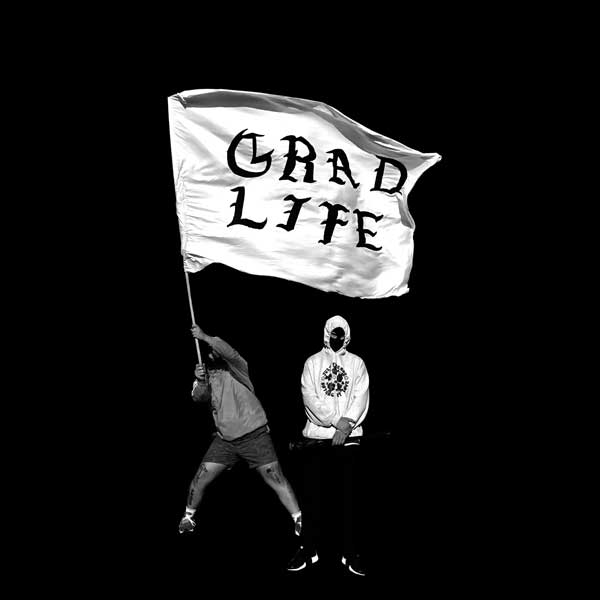
It’s a good thing that Bart Thompson doesn’t believe in fate. If he did, he might have followed the signs that the universe was giving him and not made this second Graduating Life full-length. Not only was the first tour for this once-but-no-longer solo project cancelled midway through because of the coronavirus outbreak, but Thompson didn’t have a particularly enjoyable time recording it. Most artists would shy away from being so candid about the negative aspects, but Thompson isn’t most artists.
“The recording process wasn’t that fun,” he admits. “There were moments that were, but I had this falling out with the friend who was tracking us. We’re fine now, but it kind of made me realize that I just I don’t fucking care about that shit. It ruins it for me, in a way. Then when that tour, which was first tour I was able to do with Grad Life, was cancelled, it was almost like if there’s a God, it’s pretty obvious that I’m not supposed to fucking do this! It really bummed me out.”
Thankfully, Thompson – who also plays guitar in emo outfit Mom Jeans. – didn’t let any of that stuff get to him. Instead, he looked at turning the negatives into positives, and that attitude of overcoming adversity flows through this record from beginning to end. It might start at rock bottom – ‘I have nothing left to lose’ he proclaims on “Photo Album”, a musically chirpy opener that defies its lyrical content – but at no point do these songs succumb to the darkness, to the idea of giving up. Rather, they fight back, landing punches against defeatism to ensure that, however tough the going may get, it doesn’t win. A lot of that manifests itself in the music itself – feisty, buoyant, quirky melodic not-quite-punk rock that’s full of the spirit and energy that has defined this project since Thompson started it in 2017. That’s because, even if the recording process itself wasn’t ideal, he still utterly adored – and adores – writing the songs themselves.
“Even though that first track is super defeated,” he says, “it was still fun for me to write and play. I really like the sounds on it. But that’s what all the Grad Life stuff is – a way for me to have fun and practice songwriting. I want to listen to as many bands as I can and get as much knowledge as I can and apply it to how I see songwriting and structure and stuff.”
Yet while Graduating Life is a way for Thompson to indulge in his unfettered passion for songwriting, it’s also a vehicle for emotional, existential catharsis – and often the debilitating existential angst he finds himself coming face to face with. They’re off bedfellows, but in his hands they complement each other perfectly, and it’s solely those thing he wants to focus on, rather than all the other stuff that – sadly – comes with being in a band. It means that writing, recording and self-producing these 10 songs was inherently an act of defiance and rebellion, a deliberate mission to go against what’s expected of musicians and bands these days and to protect his art from external forces in an increasingly capitalist world. For Thompson, it’s only the songs themselves and the art of creation that matters – especially in a world that seems so cruel and cold, and which has fallen prey to the evils of unfettered capitalism. A world whose harshness, whose negative impact on Thompson’s mental health, inspired him to write these very songs in the first place.
“Commodifying things that should not be commodified is ruining the world,” he says. “It’s hard to sink so much of my soul and time into a world that really doesn’t give a fuck about people who sink that much time or thought or emotion into it. They really don’t give a fuck about anyone. I feel like I’m far too emotionally invested in something that’s an absolute fucking rollercoaster and always has been. I have friends back in Fresno, where I’m from, who don’t have anything to do with the music world, and it makes you realize there are just normal people in the world who don’t think about anything that ever happens with music ever.”
That revelation has made him alter his approach to Graduating Life – both on this record, and those going forward – as well as in his own life. Like most of us, the pandemic caused Thompson to reappraise how he was spending his time and what he considered to be truly important, but he’d already started to do that any way. It’s a shift he addresses in “19 Stars”, a song that starts out mellow, beautiful and slow, but which gradually builds in volume and tempo, Thompson bellowing ‘I’m trying to be present as much as I can’ during its crescendo as an urgent, desperate clarion call to himself.
“I was already trying to be more extracurricular,” he admits, “to get out of the house and not have me living in that fake music world. I’ve taken up a bunch more hobbies and I try to get out more and always say yes to doing something – even if I don’t think I’m going to have fun. It’s hard to sit there and be like ‘I’m not happy’ and then not want to change. If you’re present, if you say ‘I’m going to be there for everything and do as much as I can’ and try to not wallow, then that can change you. Sitting around wallowing fucking sucks, or being stuck doing a job that you don’t want to do. I used to work so much and then I’d get home and I’d be fucking wiped, but what kind of a life is that? Music is so beautiful when you’re just creating it and working with someone and falling down the rabbit hole of messing with sounds and ideas, but I don’t want any of the other stuff.”
Of course, there’s a degree of irony in Thompson channeling that disgust into a set of songs, and it’s one he’s aware of. But he truly important takeaway is how he’s reframed that negativity, using it to create a marvelous record about resilience and determination and staying true to yourself and your heart. That’s exactly what he’s done. “Fine” is a surging, rollicking affirmation about living life the way you want to live, not the way society pressures you to (‘Don’t tell me how we’re being way too loud’ he sings, ‘’cause we’ll never, ever, ever turn it down’), while “Five Years” is an ode to a friend who passed away and dealing with that grief. That song, and “In The Back” (which Thompson considers the heart of this album) also hint at the new sonic direction – one that’s more electronic than band-based – for Graduating Life that Thompson has started with this record and which he says he wants to explore more in the future. Elsewhere, “Black Skinny Jeans” is a ragged rumination on a past life you can’t quite leave behind but – as it bursts and blooms with uplifting promise at the end – is also accepting of that fact. And then there’s the rousing finale of “I Wrote You This Song”, an intense, epic journey through life and love and which ruminates on the idea of a perfect love, albeit from six feet under. Yet where “Photo Album” is a downhearted lament, “I Wrote You This Song” is full of hope and joy, a wry smile looking back from the grave and celebrating, knowing that it had the strength to keep going and get through it until the very, very end. Intentionally or otherwise, that also doubles as a metaphor for Thompson’s newfound approach to music and the journey that he went on as an artist while making this record.
“I feel like I learned that I can do something better,” he says. “I’m always worried that I’m not good enough at doing something. And this record made me feel like I can write stuff that I’m still proud of, and it can still reflect on myself and I don’t have to sacrifice how I’m feeling. So instead of wallowing in something, I can put my head down and just write constantly and in the process have fun and also get over certain things. And have fun, as well.”
Tour Dates
Contact
Management: Joel Kirschenbaum
Booking: Brad Wiseman
Publicity:
US & UK: Hayley Connelly
Europe: Denise Pedicillo
AUS: Janine Morcos
Latest Release
Online Store
News & Updates
-
GRADUATING LIFE Announces Re-Release of Grad Life Out Now
March 13, 2019Rock & roll band, Graduating Life have signed with Pure Noise Records. To celebrate, t.



